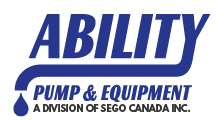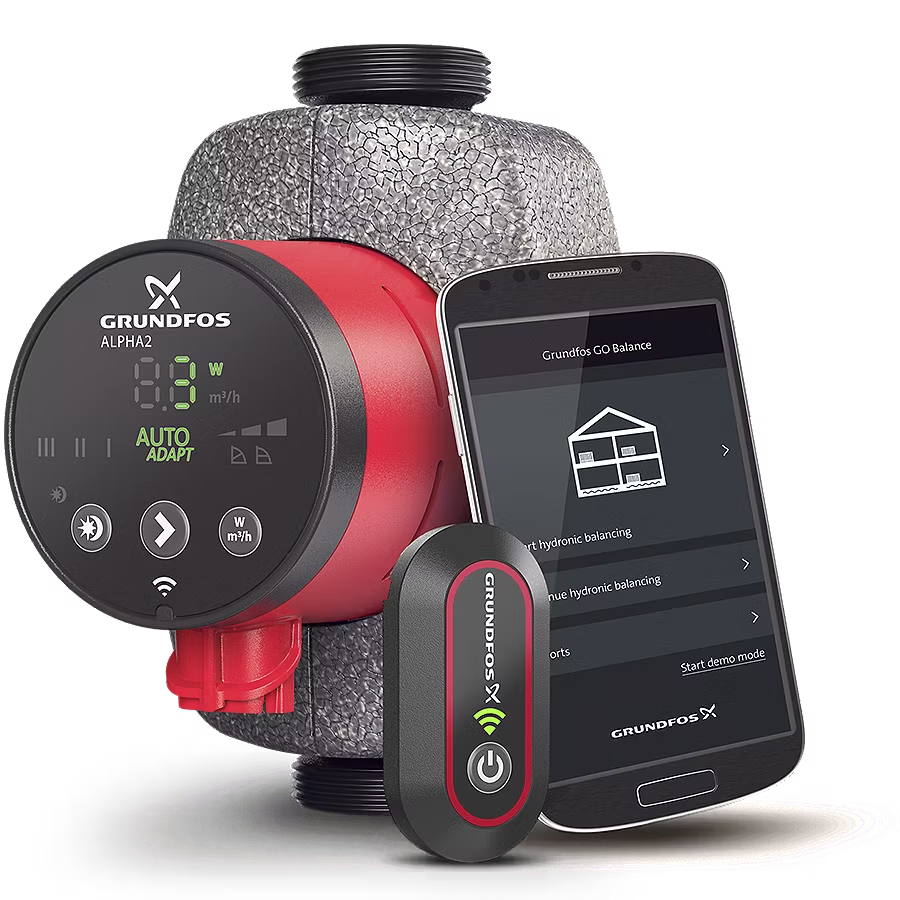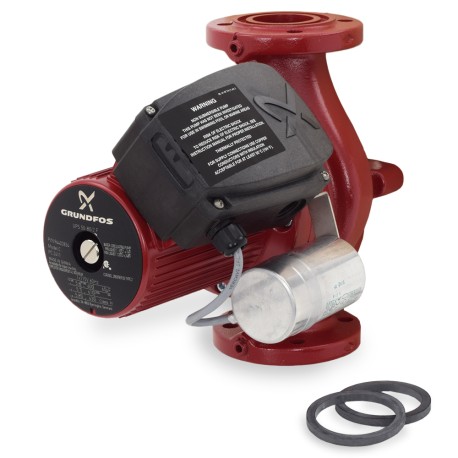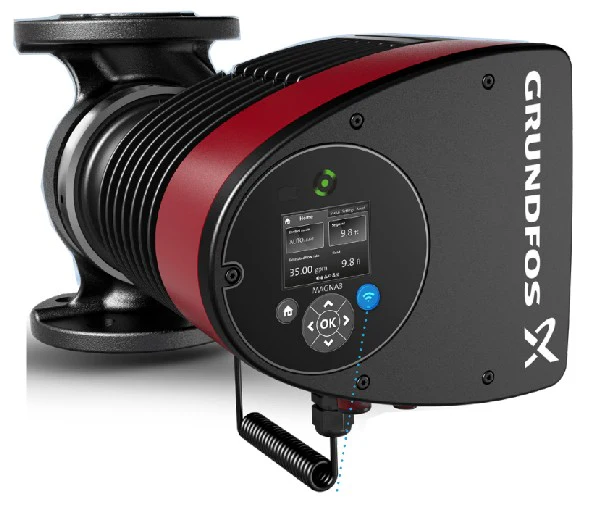Enhance Your System with Reliable Heating & Cooling Pumps
Achieve consistent temperature control and improve energy efficiency with our high-performance pumps, designed for HVAC system reliability.
Inconsistent Heating & Cooling?
Let's fix that with Variable-Speed Circulators
Traditional HVAC systems often struggle with inconsistent performance due to fluctuating system demands. Our Grundfos ALPHA and MAGNA Series pumps use variable-speed technology to automatically adjust and optimize flow rates and pressure in real time. This ensures consistent efficiency and optimal heating and cooling performance across your entire system.
Auto-adapt technology adjusts to changing demand
Optimized pump duty for energy efficiency
Improved performance in systems with varying flow and temperatures
High Maintenance and Noise Levels in HVAC Systems?
We offer Maintenance-Free, Whisper-Quiet Circulators
Many HVAC systems require frequent maintenance, leading to downtime and increased costs. Our VersaFlo UP(S) and ALPHA pumps are maintenance-free and whisper-quiet, reducing operating costs and ensuring minimal disturbance in both residential and commercial settings. These pumps are designed for long-term durability and reliable operation with low maintenance requirements.
Maintenance-free operation for ease of use
Quiet, smooth performance reduces operational noise
Durable, corrosion-resistant components for long-term reliability
High Energy Consumption in HVAC Systems?
Energy-Efficient Pumps for Reduced Power Consumption
Heating and cooling systems are notorious for their high energy costs, especially when pumps are inefficient. Our MAGNA Series and ALPHA pumps feature permanent magnet motors and variable-speed technology, reducing energy consumption by up to 50% while maintaining optimal performance.
Energy-saving technology lowers operational costs
Variable-speed adjustments ensure efficient power use
Power consumption display allows you to monitor energy use
Why Choose Ability Pump for Your HVAC Pump Needs?
Ability Pump Answers Your Top Questions
Selecting the right HVAC pump requires a clear understanding of your system’s flow rate and pressure requirements. The pump’s specifications should match the system’s head pressure and required gallons per minute (GPM) or liters per second (L/s). Variable-speed pumps, such as those in the Grundfos MAGNA series, are ideal for systems where flow and pressure fluctuate, while constant-speed pumps work best in systems with stable, predictable needs. A professional analysis of the system’s layout and demand will ensure the pump is sized correctly.
The efficiency of HVAC pumps can be affected by factors such as system design, pump selection, and operating conditions. Using variable-speed pumps can optimize efficiency by adjusting pump speeds to meet real-time demand, reducing unnecessary energy consumption. Additionally, using high-efficiency motors and ensuring the system is designed with minimal head loss and flow restrictions can improve overall pump performance and reduce energy costs.
Variable-speed pumps are particularly beneficial in HVAC systems because they adjust their speed based on the system’s demand. This dynamic adjustment results in energy savings of up to 50% compared to traditional fixed-speed pumps. Variable-speed operation also reduces wear and tear on components, increases system longevity, and ensures precise temperature control, making them ideal for both commercial and residential HVAC systems.
The pumping capacity of an HVAC pump determines how much fluid the pump can move at a given pressure. Under-sized pumps may struggle to meet the system’s demand, leading to poor performance and overloading, while over-sized pumps can cause excessive energy consumption. Properly sized pumps ensure that energy is used efficiently and that the system runs at its optimal performance level. Regular system evaluation and recalibration of flow rates can further improve energy efficiency.
The material of an HVAC pump impacts its durability, corrosion resistance, and overall system efficiency. For example, stainless steel or corrosion-resistant alloys are essential for pumps exposed to chemicals, high temperatures, or humid environments. Pumps made from high-quality materials like stainless steel, such as the Grundfos ALPHA or MAGNA series, offer superior corrosion resistance, ensuring long-term reliable operation and minimal maintenance.
Pump controllers and pressure sensors are used to monitor and manage the operation of HVAC pumps. These systems ensure the pump is running at the optimal flow rate and pressure for energy efficiency and system balance. Pressure sensors help maintain constant pressure in the system, while controllers adjust the pump’s speed and flow in response to changing demand. This intelligent control improves both system efficiency and performance.
To ensure proper sizing, you must calculate the system’s required flow rate and head pressure. If the pump is undersized, it will fail to meet the system’s demand, leading to poor temperature control and energy inefficiency. If the pump is oversized, it will waste energy and cause unnecessary wear on components. Proper sizing can be determined by evaluating the total dynamic head (TDH) of the system and matching the pump to the required performance curve.
The typical lifespan of an HVAC pump is 10-15 years, depending on the type of pump, the conditions it operates in, and how well it’s maintained. To extend the lifespan, ensure proper installation, regular maintenance, and use high-quality pumps like the Grundfos ALPHA or MAGNA series, which are designed for energy efficiency and low maintenance. Properly balancing the system’s flow rates and pressure levels can also reduce unnecessary strain on the pump.
Cavitation occurs when air bubbles form inside the pump due to low suction pressure, leading to damage and inefficiency. Airlock happens when air gets trapped in the pump system, preventing proper fluid flow. Both issues can be prevented by ensuring the pump is properly primed, using appropriate inlet sizes to maintain suction pressure, and installing automatic air-release valves where necessary. Regular maintenance and monitoring of system pressure also help to avoid these common issues.
Proper maintenance is essential for maximizing the life of HVAC pumps. Key practices include lubricating bearings, cleaning the impellers, inspecting the seals for wear, and checking the motor and electrical connections regularly. Ensuring that the strainers and filters are clear of debris will also help prevent pump failure. For variable-speed pumps, ensure that the controller is functioning properly and that the system calibration is accurate to avoid unnecessary wear on the motor.
Have More Questions?
Reach Out to Our Team Today!
Request a Quote Today!
Our expert representatives at Ability Pump are ready to help you source the right product for your needs. Submit your request and we’ll provide a tailored quote and guide you through the selection process. Fill out the form below to get started!















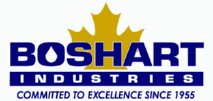











Connect with the Pump Specialists
Our team is ready to support your operations with reliable solutions.
Contact us toll-free at:
1-800-263-5353





